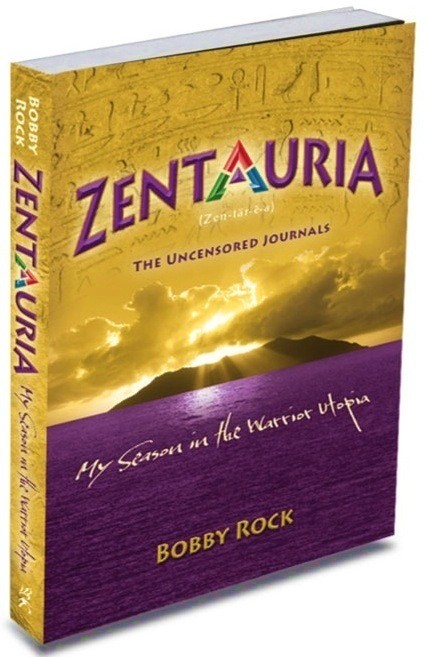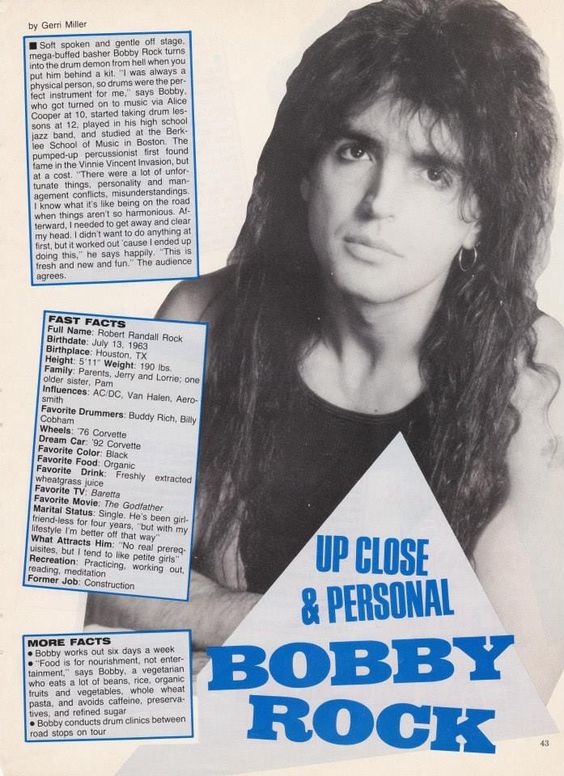The Bobby Rock Newsletter #55 (4-23-2022) - All About the Money
The Bobby Rock Newsletter #55 (4-23-2022) - All About the Money
Greetings, Everybody -
Been back in LA this week, firmly in the grind—and still “struggling” to get it all done—but loving it. I hope this week’s edition finds you all well and thriving. Let’s jump right into it:
- All About the Money… or at least this book excerpt is. How might the world’s most enlightened society view all things commerce? Let’s find out…
- The Truth About Money: What is it? Let’s find out...
- A "Fast Facts” Feature about yours truly from a rock rag some 31 years ago. How much of it is still factual? Once again… let’s find out!

Next week, kids! Hope to see some of you there...
_______________
All About the Money
Here’s an excerpt from my book, Zentauria: My Season in the Warrior Utopia. The book is essentially an 11-week documentation of life with a secretive utopian community, on a small island off the east coast of Africa. I wrote it journal-style, with a conversational narrative, but I believe the themes, experiences, and insights covered throughout might be useful or even inspiring to others.

This is an edited version of the original entry. You can read the whole thing HERE, or grab a copy of the book HERE.
All About the Money
Day 64 – 2:38 PM (Central Library)
Entry Preface: For the hardcore artist at heart, it’s often difficult to reconcile the right-brain, creative headspace of one’s artistic life, with the left-brain, pro-business mindset of one’s financial life. This is partially why many of us prefer to deal with managers, accountants, agents, assistants, and/or advisors; so we don’t have to dirty our hands with the money and, instead, so we can keep our minds and hearts “pure” to create our great works. Well, that’s the theory we like to believe, anyway.
I had been looking forward to getting the enlightened perspective on the subject around here. So far, the glimpses I’ve caught of the financial inner workings of this place are every bit as impressive as the artistic aspects. The Zentaurians as a whole keep an eye on it, but they seem to recognize money, or “digits,” as a means to an end… as the logical, anticipated, cause-and-effect result of simply being great at what you love and offering your gifts to the community in some tangible form of servitude. But the money people appear to be downright geniuses of that domain, exhibiting the same passion and fervor about managing currency, real estate, stocks, and international investments as the artists, athletes, scientists, teachers, or monks have about doing what they do. It’s an unusual but refreshing dichotomy.
* * * * * * * *
I had an interesting conversation about money and finances this morning at Town Hall with Osapha-T, a dark-skinned Shaolin priest with a thick gray beard and bushy silver eyebrows. O.T., as I like to call him, has long been recognized as one of Zentauria’s chief money men. His work space was an interesting juxtaposition of a relaxed Zen haven and a Wall Street broker’s bustling office. All of the furnishings and decor were straight out of Buddha-land, but his desk area incongruently displayed a semi-circle of computer monitors. Some had a firestorm of numbers and stock names scrolling by, while others had intricately color-coded charts, tables, and graphs. As I scanned over the screens from left to right, it was all about numbers, numbers and more numbers. I would have no idea how to decipher hardly any of this data.

“Wow,” I said. “So there’s probably no easy explanation for what all these numbers, charts, and graphs mean, huh?”
“Well, the easy explanation is that here is where we monitor and manage all of our money matters: assets, investments, expenditures, C.T.s, stock activity, everything,” he said. “Zentauria has enjoyed a long, rich history of successful money management and investments on an international scale, and this is how we continue to engage this part of our equation. It’s a full-time job for a large group of us.”
“Daaaamn,” I said, slowly shaking my head, trying to wrap my brain around the densely displayed data on all of those screens.
“You didn’t think our little island sustained itself exclusively through those lovely ocean breezes, did you?” O.T. joked.
“Well, actually I did, I guess.” We both had a chuckle.
“But that’s just it,” I continued, “it seems like for anything centered around art, altruism or activism, many people don’t consider the role money has in sustaining things. And if they are forced to consider it, they can often get disillusioned and question the underlying motive behind it all. It’s whacked.”
O.T. listened intently to what I was saying, eyes squinting and face static with deep lines and wrinkles. And then, his expression lightened and he smiled.
“The truth is,” he said, “behind every monastery, temple, church, mosque, music conservatory, or museum, there is someone, sitting in a back office in front of a computer somewhere, tallying up numbers on a spreadsheet. And that will be going on for as long as currency remains the universal medium of trade on this earth.”
“I agree,” I said. “That seems to be a reality of any such endeavor. But it’s hard to know when it’s not a flawed part of the endeavor, considering how much corruption and greed have erupted around money in so many of those very institutions you mentioned.”
“Well, corruption and greed are human conditions, based entirely on human issues, none of which are intrinsic to money.”
“But it seems that the money itself gets the bad rap,” I said, “being that it’s supposed to be at the ‘root of all evil’ and whatnot!”
“You’re speaking of cultural conditioning there… only what many have been taught about money.”
“Yeah, it’s crazy, isn’t it?”
We both stood there at the desk, gazing at the screens, watching numbers and stock abbreviations roll across some of them, taking it all in. Then O.T. invited me to have a seat across from him in his study area. We both sank into a couple of plush pleather recliners.
_______________
The Truth About Money
I continued: “So what is the bottom-line truth about money?”
“There isn’t one; currency is a completely neutral commodity. It only takes on the meaning one chooses to assign to it.”
“So this whole thing about how it’s more spiritual to be impoverished, for example, is not necessarily the truth about money?”
“It is to those who purport that to be true!” he said, smiling.
“That’s a big one, actually… you know, the whole broke-ass monk vibe.”
“It’s a story, that’s all. I’m not making a judgment call about it; I’m only saying that it’s the truth to those who choose to make it their truth.”
“Yeah, elective poverty via the denouncement of the material world seems to be that virtuous monk energy thing, where the super sparse lifestyle is viewed as synonymous with spiritual elevation.”
“And in certain cases,” O.T. said, “I’m sure one’s physical detachment from as many things in the world as possible can help facilitate a particular alignment with Source. That’s all about building a practice around a lifestyle that’s most conducive to, and representative of, non-attachment. But again, the detached lifestyle of a monk is not an indictment against having, earning, or handling money; believe me, even monks need funding.”

“No doubt,” I said. “This less-is-best directive always calls to mind that old story about Gandhi: in response to an observer’s adulation toward his humble, impoverished style of living, one of his associates famously commented that it cost Gandhi’s friends a great deal of money to keep him in poverty. In other words, while he walked around with the unassuming frugality of a man largely disassociated from the material plane, things still cost money. So, appearances and perceptions aside, the rupees had to flow to keep things moving along… even in the ‘elevated’ world of Gandhi’s mission.”
“There’s no question,” O.T. said.
Catch the entire unedited excerpt HERE. Def worth the read if this subject interests you!
_______________
Some Things Never Change!
Thought you guys might find this amusing:
A friend recently sent me this clip from a 1991 issue of Metal Edge Magazine. This was 31 years ago so, obviously, I’ve aged a bit since. But, I was astounded to read how little else has changed… lifestyle, recreation, health practices, etc. I guess you could say I’m "playing the long game.”

At any rate, I thought this level of consistency was interesting, although whether this is a good thing or a bad thing is subjective. How about you? Going back roughly half your life ago, how many of your “fast facts” might be the same? Where have the biggest changes occurred?
|

